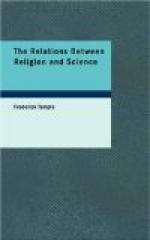The modern examination of the question begins with Hume, who maintains that the doctrine of liberty and that of necessity are both true and of course compatible with each other. But his arguments touch only the broad question whether they are true for practical purposes, not whether either is true in the strict sense and without exception or modification. To Kant’s system, on the contrary, it was essential that both doctrines should be true in the strictest sense. Holding that invariable sequence was a law of Nature known independently of experience and applicable to all phenomena in the minutest detail, he could not allow that any act of the human will lay outside the range of this law. Such an act being a phenomenon must, in his view, be subject to the law which the constitution of our minds imposed on all phenomena apparent to us. And yet, on the other hand, holding that the eternal Moral Law made us responsible for all our acts, he could not but maintain that in the doing of those acts we must be free. His mode of reconciling the two opposites amounted to this, that our action throughout life considered as a whole is free, but that each separate act considered by itself is bound to the preceding acts by the law of invariable sequence. We may illustrate this by the familiar instance of a prism acting on a ray of light. The ray has or may have a colour of its own before it passes through the prism. The prism spreads it out and shows a series of colours. The order in which this series is arranged is determined by the character of the prism acting on the nature of the ray. The colours when combined give the colour of the ray; when separated by the prism each has its own distinct character, and the order of the colours is determined, and invariably determined, by the prism. So too in Kant’s view the character of a man in itself may be free, but when it passes through the prism of time into the world of phenomena and is spread over many years it shows a number of separate actions, no one of which taken by itself exhibits the man, though all put together are the true representation of him to human perception. The man is free. His life represents his free choice. But his separate acts are what that free choice becomes when translated into a series of phenomena, and are bound each to the preceding by the law of invariable sequence. It is plain at once that this does not satisfy our consciousness. We are not conscious of freedom as regards our life as a whole; we are conscious of freedom as regards our separate actions. Our life as a whole embraces our past which is absolutely unchangeable, and our future which is not yet within our reach; we are conscious of no present power over either. Our separate acts are perceptibly subject to our own control; nay, it is by the use of our free-will in our separate acts that we are able to change the character of our life or to preserve it from change; and with this corresponds our responsibility. We hold ourselves responsible for each act as it is done; we hold ourselves responsible for the character of our lives only so far as we might have changed it by our acts. The solution leaves the difficulty where it was.




